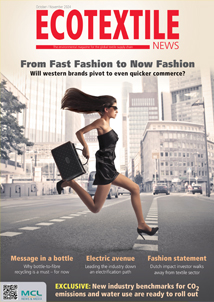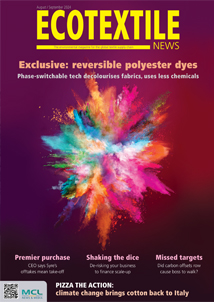VANCOUVER – The most recent Planet Textiles event featured the debut of the PT Pod, which hosted a range of interviews, including one with Mohan Senevirante, global water lead at the International Finance Corporation (IFC).
Mohan sat down to talk with us about the link between the financial sector and sustainability in the textile and apparel sector and pointed out the IFC has its own ‘global supplier finance programme’, which helps suppliers to achieve higher environmental and social compliance.
“The finance sector can play a catalytic role in achieving sustainability in the apparel sector,” he said. “At IFC, we conduct technical programmes and assessments, looking at water, energy and chemicals, and then developing customised solutions towards achieving them. Also, we develop improvement plans which include financing, so that we can achieve sustainability, and the customers will then incorporate them into their sustainable plans.”
When asked for an example, Senevirante told the Sustainable Fashion Academy’s Michael Schragger: “Fakir Apparels in Bangladesh (cotton t-shirt company), when we started working with them they were using something like 225 litres of water per kilogram of product. Once we'd finished, they had reduced it down to 50 litres, which is a 75 per cent reduction, and they have seen the business case for sustainability.
“Similarly for brands, if they incorporate sustainability into their corporate plans, they can achieve around 3 per cent more profitability, that is why not only the suppliers but the brands needs to consider sustainability as part of their DNA,” he added.
In terms of what the IFC was doing to accelerate sustainability in the apparel sector, Senevirante replied: “Let me take one example. We have a number of financial products at IFC. One is a global supplier finance programme, which helps company's suppliers to achieve higher environmental and social compliance, and they get rewarded for it.”
He continued: “when a brand places an order they may pay in 30, 60 or 90 days. That is a cost imposition for the supplier in terms of working capital. We take that order and pay in two days, for those suppliers achieving environmental and social compliance. So that is one example of that.
“Brands like Levis, Nike and Puma have already partnered with us on the global trade supply finance programme and its open to other brands as well, where they can incentivise their suppliers for doing the right thing,” he said.
Planet Textiles 2019 takes place June 22nd in Barcelona as part of the ITMA event, and looks set to sell out even quicker than last year’s event, with only 420 tickets available in total. Register now to avoid disappointment.
2019 Speakers will once again be invited to partake in filmed interviews in the Planet Textiles Pod. Interested to speak? Final call for speakers here, and for more detailed information about the event, please visit: www.planet-textiles.com.








































